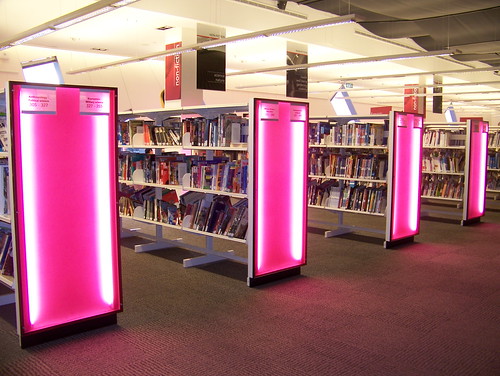There were some great additions to the trends, including the emphasis on mobile computing, though in running over the list, I’d add the blurring of public/private personae.
But Michael Golrick honed in on the challenge of my presentation: not to point out problems, but to point out responses to those problems (avoiding the pat term, “solutions”). Â His suggestion of a social-networking policy can be broadened to these responses: enable, guide, and empower library workers to strategically participate in social networks.
My challenge in the next week, before I box up my desktop computer and am PC-less until I get to California, is to come up with more responses. Â If you have thoughts, I’m all ears.
If I may segue, one of the things I have dwindling tolerance for is the librarian-bashing presentation. You know the talk, where someone gets up and points out all the ways we librarians are limited. We are timid, slow, convoluted, hesitant, short-sighted, without imagination or rigor.
The audience laughs along with these presenters — perhaps a wee uneasily — and then the bashing ends and the sparkly speaker vanishes off the stage, leaving us with nothing except a vague sense of shame and inadequacy.
About the only talk I’ve liked in that vein is Joe Lucia’s “sheeple” talk at Evergreen 2009, perhaps because he was fingering a narrow group that may bear responsibility for some of the problems that challenge us. Â But Joe also did us the favor of talking about what we need to do, and where we need to go.
I have said the user is not broken, and in many ways, I think librarians aren’t broken either. Â We have been on to some pretty good ideas for a couple thousand years. Â Sometimes we are indeed timid, slow, convoluted, hesitant, short-sighted, without imagination, and lack scientific rigor. Â Sometimes we have dumb rules, policies, and procedures that undermine the services that deep down we really want to offer. Â Sometimes — perhaps much of the time — we do what we want to do, rather than what the evidence suggests we do.
But we also have created amazing institutions that are completely at odds with so many other messages society bombards us with. We celebrate independent, even iconoclastic reading and thinking, we celebrate free information shared freely, we celebrate independent, lifelong learning.
We’re often strikingly creative; in the last year and a half I’ve given countless talks pointing out how we have a long, proud tradition of tool-creation. The color-coded shelving, above, is just one example of the many whimsical and lovely ways we reinvent what we do.
In writing workshops, it’s easy to focus on a writer’s limitations. That’s a natural tendency. But it’s equally important, though sometimes overlooked, to focus on what a writer does well. Â We all have limitations, but we all have strengths to build on.
I admire how my friend Jenny Levine focuses on the positive and the constructive. She’s really my role model in the library-presentation department — she’s smart, funny, encouraging, mentoring, creative, and new. There are many more like Jenny, and I really want to be like all of them.











Karen-
Thanks for the kind words! I am glad I could help, since you have inspired me many times. And of course, it helps to think out loud sometimes.
Thanks for the nice mention, Karen – I’m truly honored to have inspired you in any way what-so-ever. I’m just returning the favor. 🙂
Good that you pointed out the librarians’ place in history- so often the inventive, scholarly, creative aspect gets overlooked by the casual visitor, and what stands strongest in our memory is the one left behind by our own elementary school librarians, who may or may not have left a lasting positive impression.
As a children’s author, booking author presentations is done primarily through elementary school librarians, and I have to say many of my interactions are uncomfortable, even unpleasant throwbacks to the third-grade. However those like yourself, who enthusiastically reestablish their science with vitality and verve, more than make up for any challenges. I appreciate your setting the standard, particularly in your encouraging librarians to keep up with the times- I believe it’s imperative that each gatekeeper understand the use of their own keys.
tylerenfield.blogspot.com
“The user is not broken” I have cited you many times in my training materials with just that quote.
okay i’ve tried to find out, but which library is pictured in your blog? i think the shelving looks great!
I’m with you on the “bash”. I find that most of the talks presented at conferences are rehashes of the same few topics, this is frustrating, I am here to learn! But it seems, as a new grad, that at first conferences were all a world of wonder, and now everything has gotten old hat real fast and as far as i’m concerned the “bash” is sooooo 2006.
Tomorrow’s keynote at Internet Librarian is from someone I’ve heard give the bash speech several times. I hope he’s singing a different tune tomorrow.
That librarians join in the laughter points up to a serious problem that we have as a profession. We are insecure, and look for the kewl kids to tell us what to do, instead of drawing from our own legitimate experiences. Our administrators blow us off–and our input–too, and listen to the kewl kids who never worked with the public in their lives. But if the kewl kids write a a story in LJ that reverses their previous stand, the administrator becomes suddenly in favor of the newest fad.
When techies and futurists are telling us to go cutting edge, I am dealing with patrons who are first learning to keyboard, well into their 40s and 50s. Our bosses often know nothing of the possibilities–or limitations–of technology, and won’t listen to people on the ground who know how technology intersects with the public.